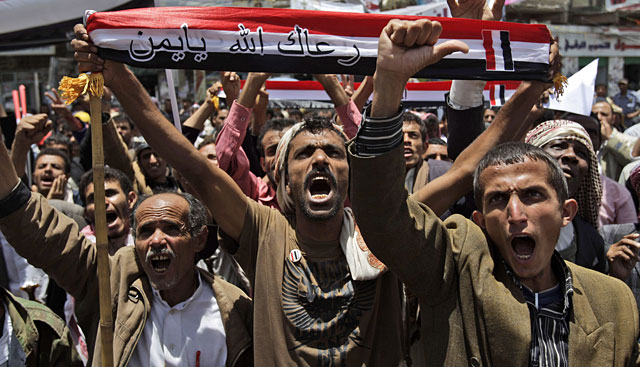Following the imminent announcement of the signing of an agreement between the Yemeni president and the opposition parties on Wednesday refused to ratify it at the last minute. The mediator Abdelatif to Ziani, secretary general of the Gulf Cooperation Council (GCC) left the country without any party had signed the plan.
Previously, government and opposition sources had revealed that the head of state, Ali Abdullah Saleh and representatives of the opposition were to initial the initiative proposed by the GCC, a group of countries led by Saudi Arabia. The proposal provided that Saleh transferring power to Vice President Rabo Mansour Hadi Abdi within 30 days after signing the agreement, the convening of elections two months later.
Government sources explained that the company was affected by the insistence of the opposition to his representative at the signing were the President of the Preparatory Committee for National Dialogue, Mohamed Salem Basendua. However, Saleh insisted that their opponents were represented by Yasin Said Numan, rotating president of the alliance of opposition groups shared encounter.
The sources pointed out that the ruling General People's Congress also requested written approval of all youth movements that direct the protests. At Ziani held continuous meetings in the Yemeni capital last Sunday to get the signature of the agreement also granted immunity to Saleh and his family.
It seemed that the deal was about this time, since the opposition had decided to withdraw their supporters to end the protests and demonstrations to demand the resignation of Saleh. Saleh has been very ambiguous about their acceptance of the proposal by the Gulf countries, as each time both sides have been ready to sign the plan has used excuses not to.
Protests in Yemen, which began on Jan. 27, calling for democratic reforms sought initially, but then began to demand the fall of the president, in power since 1978. 


Previously, government and opposition sources had revealed that the head of state, Ali Abdullah Saleh and representatives of the opposition were to initial the initiative proposed by the GCC, a group of countries led by Saudi Arabia. The proposal provided that Saleh transferring power to Vice President Rabo Mansour Hadi Abdi within 30 days after signing the agreement, the convening of elections two months later.
Government sources explained that the company was affected by the insistence of the opposition to his representative at the signing were the President of the Preparatory Committee for National Dialogue, Mohamed Salem Basendua. However, Saleh insisted that their opponents were represented by Yasin Said Numan, rotating president of the alliance of opposition groups shared encounter.
The sources pointed out that the ruling General People's Congress also requested written approval of all youth movements that direct the protests. At Ziani held continuous meetings in the Yemeni capital last Sunday to get the signature of the agreement also granted immunity to Saleh and his family.
It seemed that the deal was about this time, since the opposition had decided to withdraw their supporters to end the protests and demonstrations to demand the resignation of Saleh. Saleh has been very ambiguous about their acceptance of the proposal by the Gulf countries, as each time both sides have been ready to sign the plan has used excuses not to.
Protests in Yemen, which began on Jan. 27, calling for democratic reforms sought initially, but then began to demand the fall of the president, in power since 1978.



- Has Venezuela's Opposition Finally Learned How to Win? /¿Ha aprendido la oposición venezolana finalmente? (05/04/2011)
- Gulf mediator gives up on Yemeni political deal (18/05/2011)
- Puerto Rican Politics for Dummies: The Survey (19/05/2011)
- Good Luck! (26/04/2011)
- The Four Agreements - LOS CUATRO ACUERDOS (01/03/2011)
No comments:
Post a Comment